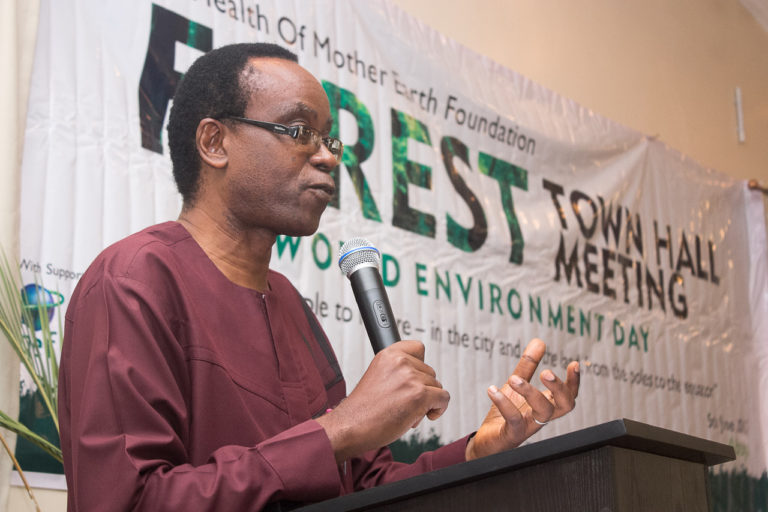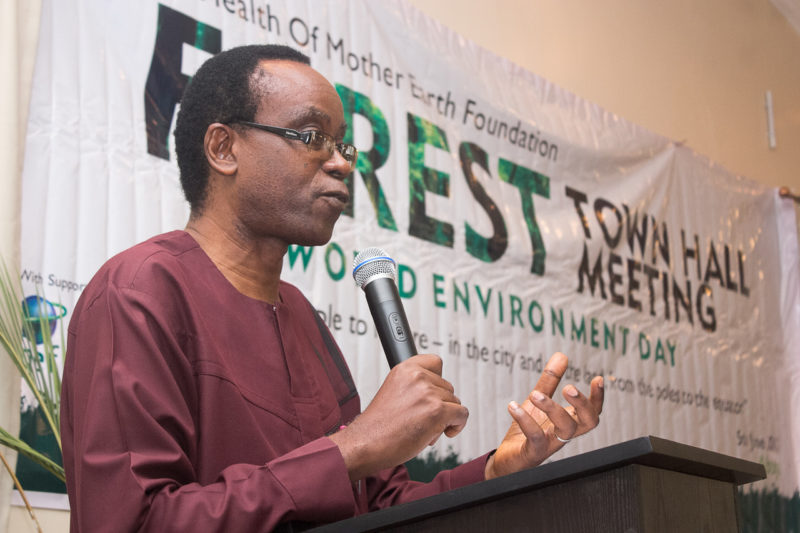
In a new publication on political economy, sociology and environmental studies, Nigerian activist, Nnimmo Bassey, authored one of the book’s 15 chapters. Titled: “The Climate Crisis and the Struggle for African Food Sovereignty”, the chapter deals with the historical roots of the food challenge in Africa. The book is titled: “The climate crisis: South African and Global Democratic Eco-Socialist Alternatives”, and is edited by Vishwas Satgar, an associate professor of International Relations at the University of the Witwatersrand in Johannesburg, South Africa, and editor of the Democratic Marxism series for which he received the distinguished contribution award from the World Association of Political Economy. Bassey sheds some light on his chapter

Besides dealing with the historical roots of the food challenge in Africa, the chapter on “The Climate Crisis and the Struggle for African Food Sovereignty” stretches from the colonial to the neo-colonial and touches on the fact that the current pressures to introduce new market-driven models is an imposition of “a complex system of interlocking oligopolies that span seeds, agrochemicals, biotechnology, trading, retailing and consumer goods companies”.
The chapter looks at the unending tales of climate woes for Africa and states that the continent can expect to be hit by more droughts and intensified desertification. This could lead to a reduction of production from rain-fed agriculture by 50 per cent in some African countries by 2020. By that same year, between 75 and 250 million Africans will face water stress and, by 2025, only a handful of African countries will not be suffering from water scarcity or stress. The implication of this for farmers and pastoralists can only be imagined. We can also expect more tensions between nations over water-sharing arrangements, as has been seen between Egypt, Sudan and Ethiopia, for instance.
The chapter also dwells on what it calls the “marketing false solutions to climate change in Africa.” In this sub-section the searchlight is pointed on climate solutions promoted globally that help lock in polluting activities and thus exacerbate the climate crisis. Some of these false solutions are said to include REDD or Reducing Emissions from Deforestation and forest Degradation, carbon trading, so-called climate-smart agriculture and genetically modified or engineered crops. These solutions generally depend on the current business infrastructure, including that of the fossil fuels industry. The false solutions have direct implications for agriculture in Africa, especially through the promoting of biofuels as an alternative or supplement to fossil fuels, synthetic biology, geo-engineering and other market mechanisms.
Another section of the chapter looks at “Genetically modified foods’ unsuccessful push” in Africa. The chapter did not foresee the cascading in of GMOs in Nigeria which may be the wedge the biotech industry needs to pry the continent open to the technology. The chapter dwells on the resistance to the introduction of GMOs through food aid, citing the 2000 Zambia situation as a prime example, and on the failure of the introduction of genetically modified cotton to small scale farmers in South Africa and Burkina Faso.
The chapter also takes a critical look at seed colonialism and land/water grabs on the continent.
As powerful as the forces pushing false climate solutions are, the people at the receiving end have been organising and mobilising arguments and actions to show what the real solutions are. People power can overturn those false arguments and autonomous actions can illustrate the foolery in the propositions that Africans can only be assured of food and nutrition through the products of laboratories, such as GMOs, or that climate-smart means modern biotechnology.
Climate change undermines planetary life-support systems. It attacks resilient systems and cultures developed over millennia. The chapter sees hope in the activities of smallholder farmers, whose practices work in sync with nature and do not depend on artificial inputs that degrade soil and biodiversity.
Food sovereignty ensures the human right to food and prioritises local food systems and local markets. It is against food dumping and promotes culturally appropriate and wholesome foods. Food sovereignty fundamentally tackles hunger by ensuring that local farmers maintain control of their farming and food systems. By this approach, Africa can regain her food independence, support the majority of our farmers in their small-scale agro-ecological farming, reduce the gender gap, increase employment and income, protect agricultural biodiversity, promote health and nutrition and mitigate global warming.